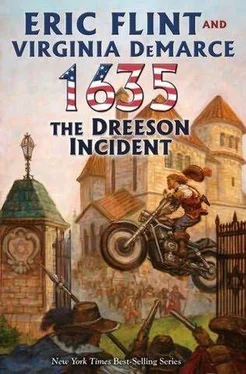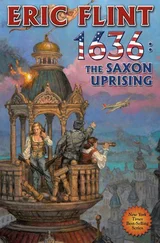Eric Flint - 1635:The Dreeson Incident
Здесь есть возможность читать онлайн «Eric Flint - 1635:The Dreeson Incident» весь текст электронной книги совершенно бесплатно (целиком полную версию без сокращений). В некоторых случаях можно слушать аудио, скачать через торрент в формате fb2 и присутствует краткое содержание. Жанр: Альтернативная история, на английском языке. Описание произведения, (предисловие) а так же отзывы посетителей доступны на портале библиотеки ЛибКат.
- Название:1635:The Dreeson Incident
- Автор:
- Жанр:
- Год:неизвестен
- ISBN:нет данных
- Рейтинг книги:5 / 5. Голосов: 1
-
Избранное:Добавить в избранное
- Отзывы:
-
Ваша оценка:
- 100
- 1
- 2
- 3
- 4
- 5
1635:The Dreeson Incident: краткое содержание, описание и аннотация
Предлагаем к чтению аннотацию, описание, краткое содержание или предисловие (зависит от того, что написал сам автор книги «1635:The Dreeson Incident»). Если вы не нашли необходимую информацию о книге — напишите в комментариях, мы постараемся отыскать её.
1635:The Dreeson Incident — читать онлайн бесплатно полную книгу (весь текст) целиком
Ниже представлен текст книги, разбитый по страницам. Система сохранения места последней прочитанной страницы, позволяет с удобством читать онлайн бесплатно книгу «1635:The Dreeson Incident», без необходимости каждый раз заново искать на чём Вы остановились. Поставьте закладку, и сможете в любой момент перейти на страницу, на которой закончили чтение.
Интервал:
Закладка:
The result amounted to an outright civil war.
The noblemen had the upper hand, at first. The CoC columns who first appeared in the province came from Mecklenburg itself. Mostly from the towns of Wismar, Rostock and Schwerin. They were well-armed but not very numerous, and they were caught off guard by the fierce reaction of the local aristocracy.
It was the sheer ferocity of the reaction that carried the field, at first. It certainly wasn't any splendid organization or discipline on the part of the nobility. The truth of the matter was that Mecklenburg's aristocracy was a sorry lot. For generations, not having the English custom of primogeniture, they had been dealing with the poverty of their rural estates by sending their more competent sons out to earn a living by serving in the armies and bureaucracies of more powerful rulers, while keeping the dumbest ones home to administer the estates. As breeding systems went, this was counter-productive.
Nor did Mecklenburg's aristocracy have the luxury of maintaining large bands of well-armed and well-trained retainers. Most of the Mecklenburg nobility didn't have any "armed retainers" at all, in the sense that an Elizabethan era English duke would have understood the term. What they had instead were their huntsmen, their stable hands, their household staff-the steward, the butler, a few footmen, the driver for the family carriage. And while many of the huntsmen, stable hands, and household staff, given the situation in the Thirty Years War, had military experience, most of them by this time who'd been in one or another of the armies had left because of some kind of physical problem that made continuing military service impractical.
So, there it was. The small CoC columns who moved incautiously into the Mecklenburg countryside were driven back into the towns by mobs of often one-armed butlers and one-eyed dog-trainers led by profane and semi-literate "noblemen" whose clothes were likely to be filthy and who almost invariably stank of drink.
Had the peasants come into the fight at that stage, things would have been different. But while the peasants might be sympathetic, the peasant militias-quite unlike the situation in Franconia, where the militias worked hand-in-glove with the Ram movement-were not coordinated with the CoC columns. The peasants armed themselves; but having done so, the militias simply guarded their own villages. Leaving the outnumbered CoCs to fight the nobility's private forces in the field.
Very quickly, the CoCs were driven back into the towns. In fact, the noble bands started following them into the towns, intending to scotch this snake while it was still small.
But then the army reacted. More precisely, the air force, which had a large base in Wismar. The air force's three warplanes assigned to the province began bombing the aristocracy's armed bands in the field, and even carried out bombing raids on some of the most prominent noblemen's estates.
They did so in complete defiance of military law, of course. They did not even have the excuse, as so many army regiments did, of being largely composed of soldiers recruited by the CoCs. Unlike the army, there was not much in the way of direct CoC influence in the USE's air force.
What there was instead, however, was a much higher degree of direct American participation. Half the air force's pilots were still up-timers from a small town-and they were furious about Henry Dreeson's murder. They'd known that kindly old man all their lives.
So, their commanders looked the other way, while "training flights" used up a preposterous quantity of munitions.
That was enough to produce a stalemate, for a week. And a week was all that Gretchen Richter and Gunther Achterhof and Spartacus needed to bring in reinforcements.
CoC columns started pouring into Mecklenburg from everywhere. By then, two weeks into Operation Krystalnacht-which actually lasted more than a month, not a single night, despite the code name-the CoCs were finished with their task in most of the provinces.
It all came to a head in what became known as the Battle of Gustrow. Seven CoC columns converged-more or less; it was a rather ragged affair-on the town and clashed in a field just to the south of it with approximately eighteen hundred armed retainers led by dozens of noblemen.
Numerically, the forces were pretty evenly matched. But it wasn't much of a contest. With their military-issue flintlock muskets, the CoC forces were far better armed than the semi-feudal retainers. They even had three six-pound cannons, whose provenance remained mysterious.
They also had radios, and were provided with constant information on the movements of their opponents by the planes flying reconnaissance overhead. (Although the aircraft weren't dropping bombs any longer. The air force's commander Jesse Wood had finally been pressured enough by Torstensson to order a stop to that.)
Within two hours, it was a rout, and the rout turned into a slaughter. Any CoC member who'd been captured by the Mecklenburg aristocracy in the early stages of the fighting had been murdered, often quite sadistically. So the CoC fighters were in no forgiving mood, now that the tables were turned. They wouldn't be taking any prisoners either. The only reason that several hundred of the enemy survived was because the battle only started in the afternoon. So, they escaped come nightfall.
As word of Gustrow spread, a peasant rebellion erupted across much of the province. The now-weakened aristocracy found themselves under siege. Their schlosses and estates burned; they and their own families massacred, if they were reckless enough to stay and try to put up a defense.
Torstensson might have finally felt compelled to intervene with the army, then. Try to, at least. But Gretchen had foreseen the danger and had already arrived in Wismar to take charge of the CoC forces in the province. Because Achterhof had been shrewd enough to keep her from indulging in pointless expeditions earlier, the CoC's most famous national leader was available when she was really needed.
The CoC columns now placed themselves at the head of the peasant rebellion. Informally, if not formally. The peasants were willing enough. They had no great familiarity with the CoCs themselves. But by now, Gretchen Richter was famous across most of Europe.
Gretchen made no attempt to actually lead the struggle in military terms. She was not a soldier. She was a political organizer, with the experience of the Amsterdam siege to guide her.
The key thing she brought was a new slogan.
Long Live the Duke!
It was well-known that Gustav Adolf, the duke of the province along with his greater titles, had clashed frequently with the pigheaded Mecklenburg nobility.
So, Long Live the Duke it was. Preposterous, that slogan might be, looked at from one angle-certainly if you knew Gretchen Richter's attitudes towards dukes in general. But it was under that slogan that the nobility of Mecklenburg was for all intents and purposes expropriated and destroyed as a class. Most of its members survived, to be sure. But they would henceforth be living as refugees in the mansions and castles of their relatives elsewhere. Mecklenburg had become as plebeian-dominated a province as the SoTF or Magdeburg, and every bit as much of a stronghold for the CoCs and the Fourth of July Party.
Emperor Gustav Adolf would be flooded with petitions in the time that followed, demanding that he do something about the horrid state of affairs in Mecklenburg.
But…
The Mecklenburg nobility really had been a monumental nuisance for him. Given their preferences, which they continued to express with extraordinary tenacity at meetings of the Estates even after Gustav Adolf became duke, the nobles of Mecklenburg would have turned the duchy into a mini-Poland with its duke having no more financial or military authority than Wladyslaw IV. So he always found reasons to delay doing anything about those petitions. Figuring that, as the years went by, the disgruntled older Mecklenburg noblemen would start dying off and their younger kin start blending in elsewhere.
Читать дальшеИнтервал:
Закладка:
Похожие книги на «1635:The Dreeson Incident»
Представляем Вашему вниманию похожие книги на «1635:The Dreeson Incident» списком для выбора. Мы отобрали схожую по названию и смыслу литературу в надежде предоставить читателям больше вариантов отыскать новые, интересные, ещё непрочитанные произведения.
Обсуждение, отзывы о книге «1635:The Dreeson Incident» и просто собственные мнения читателей. Оставьте ваши комментарии, напишите, что Вы думаете о произведении, его смысле или главных героях. Укажите что конкретно понравилось, а что нет, и почему Вы так считаете.











